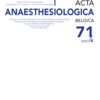Ultrasound transversus abdominis plane (TAP) block versus local infiltration analgesia for acute and chronic postoperative pain control after laparoscopic bilateral hernia repair : a single-center randomized controlled trial
Pain ; postoperative ; anesthesia ; local ; levobupivacaine
Published online: Mar 05 2022
Abstract
Background : we compared the efficacy of transversus abdominis plane (TAP) block versus local infiltration on acute and chronic pain after a first laparoscopic surgical treatment of bilateral inguinal hernia performed in a day hospital.
Methods : In this randomized, prospective, double-blind study, we studied 52 patients scheduled for lapa-roscopic bilateral hernia repair. The patients were randomly allocated to receive local infiltration (group 1) or a TAP block (group 2). The surgeon locally injected the patients in group 1 with a solution of 20 mL of 0.5 levo- bupivacaine. An ultrasound-guided injection of 40 mL 0.25 levobupivacaine was administered to the patients in group 2 by the anesthesiologist. The pain score was assessed using a numeric rating scale at the arrival in the recovery room, one hour after surgery and 6 hours (H+6) after arrival at the recovery room. Subsequently, the pain was assessed 24 hours (H+24), 3 weeks (D21) and 3 months (M3) after surgery.
Results : We observed significant differences in terms of pain at H+6 and at H+24 in favor of the TAP block group. However, there was no significant difference between both groups in postoperative pain after 3 weeks (D21) or after 3 months (M3).
Conclusions : In our study, we observed a significant difference in terms of pain in favor of TAP block versus local infiltration, during the first 24 hours after a first laparoscopic treatment of inguinal hernia. We did not find any significant difference on chronic pain.
